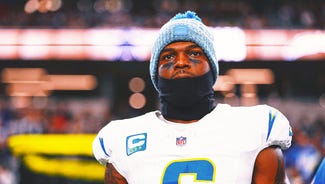Long-banned athlete protest acts expected at Tokyo Olympics
TOKYO (AP) — Athlete activism is making a comeback at these Olympic Games.
When play starts at the Tokyo Games on Wednesday, acts of free expression of the kind athletes were long banned from making at the Olympics will take center stage.
The British women’s soccer team has
“We want to show to everyone this is something serious," Britain defender Demi Stokes said. "What a way to do it, on an Olympic stage.”
One hour later in Tokyo, the United States and Sweden should follow in a gesture recognized globally since the murder of George Floyd 14 months ago. The England and Italy men's teams took a knee before the European Championship final this month.
What is common in modern soccer starts a new era for Olympic athletes more than 50 years after
Still, it is a limited freedom allowed by the International Olympic Committee, which just this month
Gestures are now allowed before races and games start, on the field, and at the start line.
Medal podiums remain off limits for protest, and even the IOC concessions left each sport’s governing body free to retain the ban.
Lawyers who study Rule 50 of the Olympic Charter — that banned any kind of “demonstration or political, religious or racial propaganda” until July 2 — see issues ahead with athletes and the IOC heading on a fast track to the Court of Arbitration for Sport.
“I think we can clearly expect some frictions around Rule 50 in the coming weeks,” sports law academic Antoine Duval said when hosting a recent debate on the inevitable athlete activism at Tokyo.
FIFA has had a relaxed view on taking a knee since players were inspired by the Black Lives Matter movement last year.
“FIFA believes in freedom of speech and opinion, and this applies to players, coaches, officials and any other person or organization within the scope of FIFA’s activities,” soccer’s world body said in a statement.
Expect raised fists at least on the start line in the main Olympic stadium when track and field events begin on July 30.
World Athletics president Sebastian Coe, a two-time Olympic gold medalist in the 1,500 meters, has
“I’ve been very clear that if an athlete chooses to take the knee on a podium then I’m supportive of that,” Coe said inside Tokyo's National Stadium last October.
Soccer and athletics are the progressive end of the 33 sports governing bodies at these Summer Games.
Swimmers’ pre-race introductions are similar to track athletes, one by one toward their starting block, but governing body FINA followed the IOC announcement by refusing to allow any gesture that could be viewed as protest.
FINA president
That stance was at odds with the new Rule 50 guidance yet was defended by IOC president Thomas Bach last week.
“There is not really a ‘one size fits all’ solution,” Bach said when asked about the apparent contradiction of some Olympic athletes having fewer freedoms than others in Tokyo.
It will fall to the IOC to decide on potential disciplinary cases which it promised to handle “in full transparency.”
This could lead to inconsistencies, according to Mark James, who teaches sports law at Manchester Metropolitan University in England.
“There will be flashpoints,” James said in the Rule 50 debate hosted by Netherlands-based Asser Institute. “Why are some (gestures) acceptable but some are a breach?”
James anticipated issues over the political intent of flags, and if the more open approach to athlete free speech in Tokyo would survive in China at the 2022 Beijing Winter Games.
What seems clear is a shift in the social media era of athletes' influence over event organizers and sports bodies.
“It is not just an IOC challenge, this is global sport,” said David Grevemberg from the Geneva-based Centre for Sport and Human Rights.
“This is actually, I would say, a crossroads for all sport.”
___
More AP Olympics: https://apnews.com/hub/Olympics and https://twitter.com/AP_Sports

2025 NFL Playoff Picture, Bracket, Schedule: 8 Teams Clinch Spots in Week 16

2025 Big Bets Report: 6-Figure, 15-Leg Parlay Alive; CFP Bettor Loses $1.25 Milly

Men's CBK Top 25: Upset Duke Drops From Top 5, No. 2 Michigan Picks Up Votes

Monday Morning NFL Top 10 Rankings: A New No. 1; Bears, Jaguars Climb; Broncos Fall

Steelers WR DK Metcalf's Suspension Upheld, $45M Future Guaranteed Money Voided

College Basketball Rankings: Casey Jacobsen Welcomes Kentucky Back, Top 3 Unchanged

Super Bowl 2026 Odds: Did Rams, Broncos Fall With Week 16 Losses?

Michigan Head Coach Search Rumors: Biff Poggi Shares Timeline for Hire

10 Takeaways from the College Football Playoff First-Round Nail-Biters and Blowouts

2025 NFL Playoff Picture, Bracket, Schedule: 8 Teams Clinch Spots in Week 16

2025 Big Bets Report: 6-Figure, 15-Leg Parlay Alive; CFP Bettor Loses $1.25 Milly

Men's CBK Top 25: Upset Duke Drops From Top 5, No. 2 Michigan Picks Up Votes

Monday Morning NFL Top 10 Rankings: A New No. 1; Bears, Jaguars Climb; Broncos Fall

Steelers WR DK Metcalf's Suspension Upheld, $45M Future Guaranteed Money Voided

College Basketball Rankings: Casey Jacobsen Welcomes Kentucky Back, Top 3 Unchanged

Super Bowl 2026 Odds: Did Rams, Broncos Fall With Week 16 Losses?

Michigan Head Coach Search Rumors: Biff Poggi Shares Timeline for Hire

10 Takeaways from the College Football Playoff First-Round Nail-Biters and Blowouts
